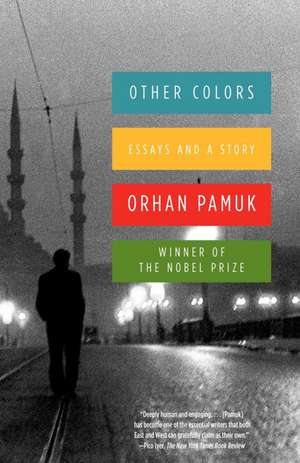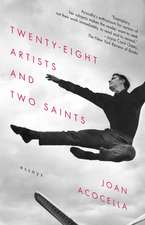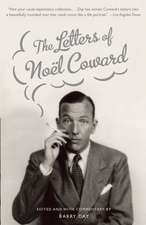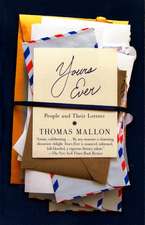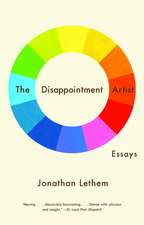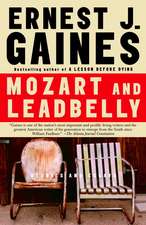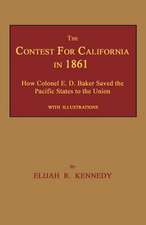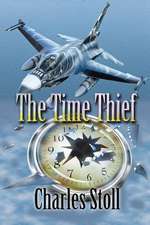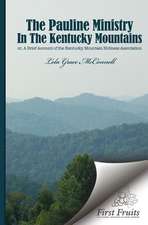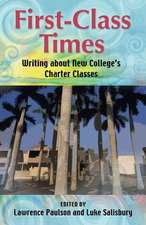Other Colors: Essays and a Story
Autor Orhan Pamuk Traducere de Maureen Freelyen Limba Engleză Paperback – 31 oct 2008
Preț: 130.68 lei
Nou
Puncte Express: 196
Preț estimativ în valută:
25.00€ • 26.11$ • 20.70£
25.00€ • 26.11$ • 20.70£
Carte tipărită la comandă
Livrare economică 04-18 aprilie
Preluare comenzi: 021 569.72.76
Specificații
ISBN-13: 9780307386236
ISBN-10: 0307386236
Pagini: 439
Dimensiuni: 133 x 203 x 25 mm
Greutate: 0.43 kg
Editura: Vintage Books USA
ISBN-10: 0307386236
Pagini: 439
Dimensiuni: 133 x 203 x 25 mm
Greutate: 0.43 kg
Editura: Vintage Books USA
Notă biografică
Orhan Pamuk is the winner of the Nobel Prize for Literature for 2006. His novel My Name is Red won the 2003 IMPAC Dublin Literary Award. His work has been translated into more than twenty languages. He lives in Istanbuland New York.
Extras
Chapter One: The Implied Author
I have been writing for thirty years. I have been reciting these words for some time now. I’ve been reciting them for so long, in fact, that they have ceased to be true, for now I am entering into my thirty-first year as a writer. I do still like saying that I’ve been writing novels for thirty years—though this is a bit of an exaggeration. From time to time, I do other sorts of writing: essays, criticism, reflections on Istanbul or politics, and speeches. But my true vocation, the thing that binds me to life, is writing novels. There are plenty of brilliant writers who’ve been writing much longer than I, who’ve been writing for half a century without paying the matter much attention. There are also the great writers to whom I return again and again, Tolstoy, Dostoyevsky, and Thomas Mann, whose careers spanned more than fifty years. . . . So why do I make so much of my thirtieth anniversary as a writer? I do so because I wish to talk about writing, and most particularly novel writing, as a habit.
In order to be happy I must have my daily dose of literature. In this I am no different from the patient who must take a spoon of medicine each day. When I learned, as a child, that diabetics needed an injection every day, I felt bad for them as anyone might; I may even have thought of them as half dead. My dependence on literature must make me half dead in the same way. Especially when I was a young writer, I sensed that others saw me as cut off from the real world and so doomed to be “half dead.” Or perhaps the right term is “half a ghost.” I have sometimes even entertained the thought that I was fully dead and trying to breathe life back into my corpse with literature. For me, literature is a medicine. Like the medicine that others take by spoon or injection, my daily dose of literature—my daily fix, if you will—must meet certain standards.
First, the medicine must be good. Its goodness is what tells me how true and potent it is. To read a dense, deep passage in a novel, to enter into that world and believe it to be true—nothing makes me happier, nothing more surely binds me to life. I also prefer that the writer be dead, because then there is no little cloud of jealousy to darken my admiration. The older I get, the more convinced I am that the best books are by dead writers. Even if they are not yet dead, to sense their presence is to sense a ghost. This is why, when we see great writers in the street, we treat them like ghosts, not quite believing our eyes as we marvel from a distance. A few brave souls approach the ghosts for autographs. Sometimes I remind myself that these writers will die soon and, once they are dead, the books that are their legacy will occupy an even more cherished place in our hearts. Though of course this is not always the case.
If my daily dose of literature is something I myself am writing, it’s all very different. Because for those who share my affliction, the best cure of all, and the greatest source of happiness, is to write a good half page every day. For thirty years I’ve spent an average of ten hours a day alone in a room, sitting at my desk. If you count only the work that is good enough to be published, my daily average is a good deal less than half a page. Most of what I write does not meet my own standards of quality control. These, I put to you, are two great sources of misery.
But please don’t misunderstand me: A writer who is as dependent on literature as I am can never be so superficial as to find happiness in the beauty of the books he has already written, nor can he congratulate himself on their number or what these books achieved. Literature does not allow such a writer to pretend to save the world; rather, it gives him a chance to save the day. And all days are difficult. Days are especially difficult when you don’t do any writing. When you cannot do any writing. The point is to find enough hope to get through the day, and, if the book or the page you are reading is good, to find joy in it, and happiness, if only for a day.
Let me explain what I feel on a day when I’ve not written well, am unable to lose myself in a book. First, the world changes before my eyes; it becomes unbearable, abominable. Those who know me can see it happening, for I myself come to resemble the world I see around me. For example, my daughter can tell I have not written well that day from the abject hopelessness on my face in the evening. I would like to be able to hide this from her, but I cannot. During these dark moments, I feel as if there is no line between life and death. I don’t want to speak to anyone—just as well, since no one seeing me in this state has any desire to speak to me either. A mild version of this despair descends on me every afternoon, between one and three, but I have learned how to treat it with reading and writing: If I act promptly, I can spare myself a full retreat into death-in-life.
If I’ve had to go a long stretch without my paper-and-ink cure, be it due to travel, an unpaid gas bill, military service (as was once the case), political affairs (as has been the case more recently), or any number of other obstacles, I can feel misery setting inside me like cement. My body has difficulty moving, my joints get stiff, my head turns to stone, my perspiration even seems to smell differently. This misery is likely to grow, for life is full of things that conspire to keep a person from literature. I might be sitting in a crowded political meeting, or chatting with my classmates in a school corridor, or eating a holiday meal with my relatives, struggling to converse with a well-meaning person of unlike mind, or occupied with whatever is on the TV screen; I can be at an important business meeting or making an ordinary purchase, making my way to the notary or having my picture taken for a visa—when suddenly my eyelids grow heavy and, though it is the middle of the day, I fall asleep. When I am far from home, and so unable to return to my room to spend time alone, my only consolation is a nap in the middle of the day.
So yes, the real hunger here is not for literature but for a room where I can be alone with my thoughts. In such a room I can invent beautiful dreams about those same crowded places—those family gatherings, school reunions, festive dinners, and all the people who attend them. I enrich the crowded holiday meals with imagined details and make the people themselves more amusing. In dreams, of course, everything and everyone is interesting, captivating, and real. I make the new world from the stuff of the known world. Here we come to the heart of the matter. To write well, I must first be bored to distraction; to be bored to distraction, I must enter into life. It is when I am bombarded with noise, sitting in an office full of ringing phones, surrounded by friends and loved ones on a sunny seashore or at a rainy funeral—in other words, at the very moment when I begin to sense the heart of the scene unfolding around me—that I will suddenly feel as if I’m no longer really there but watching from the sidelines. I’ll begin to daydream. If I’m feeling pessimistic, I think only about how bored I am. Either way, a voice inside urges me to go back to the room and sit down at the table.
I have no idea how most people answer such voices, but my manner of response turns people like me into writers. My guess is that it turns us more typically into writers of prose and of fiction than of verse. Here, then, is a bit more insight into the properties of the medicine I must make sure to take every day. We can see now that its active ingredients are boredom, real life, and the life of the imagination.
The pleasure I take in this confession and the fear I feel speaking honestly about myself—together they lead me to a serious and important insight I would now like to share with you. I would like to propose a simple theory that begins from the idea that writing is a solace, even a remedy, at least for novelists like me: We choose our subjects, and shape our novels, to suit our daily daydream requirements. A novel is inspired by ideas, passions, furies, and desires—this we all know. To please our lovers, to belittle our enemies, to extol something we adore, to delight in speaking authoritatively about something of which we know nothing, to take pleasure in times lost and remembered, to dream of making love or reading or engaging with politics, to indulge in one’s particular worries, one’s personal habits—these and any number of other obscure or even nonsensical desires are what shape us, in ways both clear and mysterious. . . . These same desires inspire the daydreams to which we give voice. We may not understand where they come from or what, if anything, our daydreams may signify, but when we sit down to write it is our daydreams that breathe life into us, as wind from an unknown place stirs an aeolian harp. One might even say that we surrender to this mysterious wind like a captain who has no idea where he’s bound.
At the same time, in one part of our minds, we can pinpoint our location on the map exactly, just as we can remember the point toward which we are traveling. Even at those times when I surrender unconditionally to the wind, I am able—at least according to some other writers I know and admire—to retain my general sense of direction. Before I set out I will have made plans: divided the story I wish to tell into sections, determined which ports my ship will visit and what loads it will carry and drop off along the way, estimated the time of my journey, and charted its course. But if the wind, having blown in from unknown quarters and filled my sails, decides to change the direction of my story, I will not resist. For what the ship most ardently seeks is the feeling of wholeness and perfection in plying its way under full sail. It is as if I am looking for that special place and time in which everything flows into everything else, everything is linked, and everything is aware, as it were, of everything else. All at once, the wind will die down and I will find myself becalmed in a place where nothing moves. Yet I’ll sense that there are things in these calm and misty waters that will, if I am patient, move the novel forward.
What I most long for is the sort of spiritual inspiration I described in my novel Snow. It is not dissimilar to the sort of inspiration Coleridge describes in “Kubla Khan.” I long for inspiration to come to me (as poems did to Coleridge—and to Ka, Snow’s hero) in a dramatic way, preferably already formed as scenes and situations that might sit well in a novel. If I wait patiently and attentively, my wish comes true. To write a novel is to be open to these desires, winds, and inspirations, and also to the dark recesses of our minds and their moments of mist and stillness.
For what is a novel but a story that fills its sails with these winds, that answers and builds upon inspirations that blow in from unknown quarters, and seizes upon all the daydreams we’ve invented for our diversion, bringing them together into a meaningful whole. Above all else, a novel is a vessel that carries inside it a dream world we wish to keep, forever alive and forever ready. Novels are held together by the little pieces of daydreams that help us, from the moment we enter them, forget the tedious world we long to escape. The more we write, the richer these dreams become and the broader, more detailed, more complete seems that second world inside the vessel. We come to know this world through writing, and the better we know it, the easier it is to carry it around in our heads. If I am in the middle of a novel and writing well, I enter easily into its dreams. For novels are new worlds into which we move happily through reading or even more fully by writing: A novelist shapes his works in such a way as to most easily carry the dreams he wishes to elaborate. Just as these works offer happiness to the attentive reader, so, too, do they offer the writer a solid and sound new world in which to lose himself and seek happiness at any hour of the day. If I feel able to create even a tiny part of such a miraculous world, I feel content the moment I reach my desk, with my pen and paper. In no time at all I can leave behind the familiar boring world of every day for this other, bigger place and wander freely; most of the time I have no desire to return to real life or to reach the end of the novel. This feeling is, I think, related to the response I am happiest to hear when I tell readers that I am writing a new novel: “Please make your novel really long!” I am proud to boast that I hear this a thousand times more often than the publisher’s perennial entreaty: “Make it short!”
How is it that a habit drawing on a single person’s joys and pleasures can produce a work that interests so many others? Readers of My Name Is Red like to recall Shekure’s remarks to the effect that trying to explain everything is a sort of idiocy. My own sympathies in this scene are not with Orhan, my little hero and namesake, but with the mother, who is gently poking fun at him. If, however, you will permit me to commit another idiocy and act like Orhan, I’d like to try to explain why dreams that work as medicine for the writer can serve the reader the same way: Because if I am entirely inside the novel and writing well—if I have distanced myself from the ringing phone, from all the troubles and demands and tedium of everyday life—the rules by which my free-floating heaven operates recall the games I played as a child. It is as if everything has become simpler, as if I am in a world where I can see into every house, car, ship, and building because they are all made of glass; they have begun to reveal to me their secrets. My job is to divine the rules and listen: to watch with pleasure the goings-on in each interior, to step into cars and buses with my heroes and travel about Istanbul, visiting places that have come to bore me, seeing them with new eyes and, in so doing, transforming them; my job is to have fun, be irresponsible, because while I’m amusing myself (as we like to tell children) I might just learn something.
From the Hardcover edition.
I have been writing for thirty years. I have been reciting these words for some time now. I’ve been reciting them for so long, in fact, that they have ceased to be true, for now I am entering into my thirty-first year as a writer. I do still like saying that I’ve been writing novels for thirty years—though this is a bit of an exaggeration. From time to time, I do other sorts of writing: essays, criticism, reflections on Istanbul or politics, and speeches. But my true vocation, the thing that binds me to life, is writing novels. There are plenty of brilliant writers who’ve been writing much longer than I, who’ve been writing for half a century without paying the matter much attention. There are also the great writers to whom I return again and again, Tolstoy, Dostoyevsky, and Thomas Mann, whose careers spanned more than fifty years. . . . So why do I make so much of my thirtieth anniversary as a writer? I do so because I wish to talk about writing, and most particularly novel writing, as a habit.
In order to be happy I must have my daily dose of literature. In this I am no different from the patient who must take a spoon of medicine each day. When I learned, as a child, that diabetics needed an injection every day, I felt bad for them as anyone might; I may even have thought of them as half dead. My dependence on literature must make me half dead in the same way. Especially when I was a young writer, I sensed that others saw me as cut off from the real world and so doomed to be “half dead.” Or perhaps the right term is “half a ghost.” I have sometimes even entertained the thought that I was fully dead and trying to breathe life back into my corpse with literature. For me, literature is a medicine. Like the medicine that others take by spoon or injection, my daily dose of literature—my daily fix, if you will—must meet certain standards.
First, the medicine must be good. Its goodness is what tells me how true and potent it is. To read a dense, deep passage in a novel, to enter into that world and believe it to be true—nothing makes me happier, nothing more surely binds me to life. I also prefer that the writer be dead, because then there is no little cloud of jealousy to darken my admiration. The older I get, the more convinced I am that the best books are by dead writers. Even if they are not yet dead, to sense their presence is to sense a ghost. This is why, when we see great writers in the street, we treat them like ghosts, not quite believing our eyes as we marvel from a distance. A few brave souls approach the ghosts for autographs. Sometimes I remind myself that these writers will die soon and, once they are dead, the books that are their legacy will occupy an even more cherished place in our hearts. Though of course this is not always the case.
If my daily dose of literature is something I myself am writing, it’s all very different. Because for those who share my affliction, the best cure of all, and the greatest source of happiness, is to write a good half page every day. For thirty years I’ve spent an average of ten hours a day alone in a room, sitting at my desk. If you count only the work that is good enough to be published, my daily average is a good deal less than half a page. Most of what I write does not meet my own standards of quality control. These, I put to you, are two great sources of misery.
But please don’t misunderstand me: A writer who is as dependent on literature as I am can never be so superficial as to find happiness in the beauty of the books he has already written, nor can he congratulate himself on their number or what these books achieved. Literature does not allow such a writer to pretend to save the world; rather, it gives him a chance to save the day. And all days are difficult. Days are especially difficult when you don’t do any writing. When you cannot do any writing. The point is to find enough hope to get through the day, and, if the book or the page you are reading is good, to find joy in it, and happiness, if only for a day.
Let me explain what I feel on a day when I’ve not written well, am unable to lose myself in a book. First, the world changes before my eyes; it becomes unbearable, abominable. Those who know me can see it happening, for I myself come to resemble the world I see around me. For example, my daughter can tell I have not written well that day from the abject hopelessness on my face in the evening. I would like to be able to hide this from her, but I cannot. During these dark moments, I feel as if there is no line between life and death. I don’t want to speak to anyone—just as well, since no one seeing me in this state has any desire to speak to me either. A mild version of this despair descends on me every afternoon, between one and three, but I have learned how to treat it with reading and writing: If I act promptly, I can spare myself a full retreat into death-in-life.
If I’ve had to go a long stretch without my paper-and-ink cure, be it due to travel, an unpaid gas bill, military service (as was once the case), political affairs (as has been the case more recently), or any number of other obstacles, I can feel misery setting inside me like cement. My body has difficulty moving, my joints get stiff, my head turns to stone, my perspiration even seems to smell differently. This misery is likely to grow, for life is full of things that conspire to keep a person from literature. I might be sitting in a crowded political meeting, or chatting with my classmates in a school corridor, or eating a holiday meal with my relatives, struggling to converse with a well-meaning person of unlike mind, or occupied with whatever is on the TV screen; I can be at an important business meeting or making an ordinary purchase, making my way to the notary or having my picture taken for a visa—when suddenly my eyelids grow heavy and, though it is the middle of the day, I fall asleep. When I am far from home, and so unable to return to my room to spend time alone, my only consolation is a nap in the middle of the day.
So yes, the real hunger here is not for literature but for a room where I can be alone with my thoughts. In such a room I can invent beautiful dreams about those same crowded places—those family gatherings, school reunions, festive dinners, and all the people who attend them. I enrich the crowded holiday meals with imagined details and make the people themselves more amusing. In dreams, of course, everything and everyone is interesting, captivating, and real. I make the new world from the stuff of the known world. Here we come to the heart of the matter. To write well, I must first be bored to distraction; to be bored to distraction, I must enter into life. It is when I am bombarded with noise, sitting in an office full of ringing phones, surrounded by friends and loved ones on a sunny seashore or at a rainy funeral—in other words, at the very moment when I begin to sense the heart of the scene unfolding around me—that I will suddenly feel as if I’m no longer really there but watching from the sidelines. I’ll begin to daydream. If I’m feeling pessimistic, I think only about how bored I am. Either way, a voice inside urges me to go back to the room and sit down at the table.
I have no idea how most people answer such voices, but my manner of response turns people like me into writers. My guess is that it turns us more typically into writers of prose and of fiction than of verse. Here, then, is a bit more insight into the properties of the medicine I must make sure to take every day. We can see now that its active ingredients are boredom, real life, and the life of the imagination.
The pleasure I take in this confession and the fear I feel speaking honestly about myself—together they lead me to a serious and important insight I would now like to share with you. I would like to propose a simple theory that begins from the idea that writing is a solace, even a remedy, at least for novelists like me: We choose our subjects, and shape our novels, to suit our daily daydream requirements. A novel is inspired by ideas, passions, furies, and desires—this we all know. To please our lovers, to belittle our enemies, to extol something we adore, to delight in speaking authoritatively about something of which we know nothing, to take pleasure in times lost and remembered, to dream of making love or reading or engaging with politics, to indulge in one’s particular worries, one’s personal habits—these and any number of other obscure or even nonsensical desires are what shape us, in ways both clear and mysterious. . . . These same desires inspire the daydreams to which we give voice. We may not understand where they come from or what, if anything, our daydreams may signify, but when we sit down to write it is our daydreams that breathe life into us, as wind from an unknown place stirs an aeolian harp. One might even say that we surrender to this mysterious wind like a captain who has no idea where he’s bound.
At the same time, in one part of our minds, we can pinpoint our location on the map exactly, just as we can remember the point toward which we are traveling. Even at those times when I surrender unconditionally to the wind, I am able—at least according to some other writers I know and admire—to retain my general sense of direction. Before I set out I will have made plans: divided the story I wish to tell into sections, determined which ports my ship will visit and what loads it will carry and drop off along the way, estimated the time of my journey, and charted its course. But if the wind, having blown in from unknown quarters and filled my sails, decides to change the direction of my story, I will not resist. For what the ship most ardently seeks is the feeling of wholeness and perfection in plying its way under full sail. It is as if I am looking for that special place and time in which everything flows into everything else, everything is linked, and everything is aware, as it were, of everything else. All at once, the wind will die down and I will find myself becalmed in a place where nothing moves. Yet I’ll sense that there are things in these calm and misty waters that will, if I am patient, move the novel forward.
What I most long for is the sort of spiritual inspiration I described in my novel Snow. It is not dissimilar to the sort of inspiration Coleridge describes in “Kubla Khan.” I long for inspiration to come to me (as poems did to Coleridge—and to Ka, Snow’s hero) in a dramatic way, preferably already formed as scenes and situations that might sit well in a novel. If I wait patiently and attentively, my wish comes true. To write a novel is to be open to these desires, winds, and inspirations, and also to the dark recesses of our minds and their moments of mist and stillness.
For what is a novel but a story that fills its sails with these winds, that answers and builds upon inspirations that blow in from unknown quarters, and seizes upon all the daydreams we’ve invented for our diversion, bringing them together into a meaningful whole. Above all else, a novel is a vessel that carries inside it a dream world we wish to keep, forever alive and forever ready. Novels are held together by the little pieces of daydreams that help us, from the moment we enter them, forget the tedious world we long to escape. The more we write, the richer these dreams become and the broader, more detailed, more complete seems that second world inside the vessel. We come to know this world through writing, and the better we know it, the easier it is to carry it around in our heads. If I am in the middle of a novel and writing well, I enter easily into its dreams. For novels are new worlds into which we move happily through reading or even more fully by writing: A novelist shapes his works in such a way as to most easily carry the dreams he wishes to elaborate. Just as these works offer happiness to the attentive reader, so, too, do they offer the writer a solid and sound new world in which to lose himself and seek happiness at any hour of the day. If I feel able to create even a tiny part of such a miraculous world, I feel content the moment I reach my desk, with my pen and paper. In no time at all I can leave behind the familiar boring world of every day for this other, bigger place and wander freely; most of the time I have no desire to return to real life or to reach the end of the novel. This feeling is, I think, related to the response I am happiest to hear when I tell readers that I am writing a new novel: “Please make your novel really long!” I am proud to boast that I hear this a thousand times more often than the publisher’s perennial entreaty: “Make it short!”
How is it that a habit drawing on a single person’s joys and pleasures can produce a work that interests so many others? Readers of My Name Is Red like to recall Shekure’s remarks to the effect that trying to explain everything is a sort of idiocy. My own sympathies in this scene are not with Orhan, my little hero and namesake, but with the mother, who is gently poking fun at him. If, however, you will permit me to commit another idiocy and act like Orhan, I’d like to try to explain why dreams that work as medicine for the writer can serve the reader the same way: Because if I am entirely inside the novel and writing well—if I have distanced myself from the ringing phone, from all the troubles and demands and tedium of everyday life—the rules by which my free-floating heaven operates recall the games I played as a child. It is as if everything has become simpler, as if I am in a world where I can see into every house, car, ship, and building because they are all made of glass; they have begun to reveal to me their secrets. My job is to divine the rules and listen: to watch with pleasure the goings-on in each interior, to step into cars and buses with my heroes and travel about Istanbul, visiting places that have come to bore me, seeing them with new eyes and, in so doing, transforming them; my job is to have fun, be irresponsible, because while I’m amusing myself (as we like to tell children) I might just learn something.
From the Hardcover edition.
Recenzii
“Lyrical, vulnerable, deeply human and engaging. . . . [Pamuk] has become one of the essential writers that both East and West can gratefully claim as their own.” —Pico Iyer, The New York Times Book Review“Lyrical and reportorial. . . . Forms a remarkably cohesive picture of a literary man.” —The Washington Post Book World“Striking and valuable. . . . A triumph.” —The New York Review of Books“Reading these pieces one is infused with the sheer joy that exudes from each tale. . . . An autobiography in essays and tales, a book for writers and readers that is never less than captivating.” —The Baltimore Sun
Descriere
From the winner of the Nobel Prize in Literature comes this collection of stories that are lyrical, vulnerable, [and] deeply human ("The New York Times Book Review").
